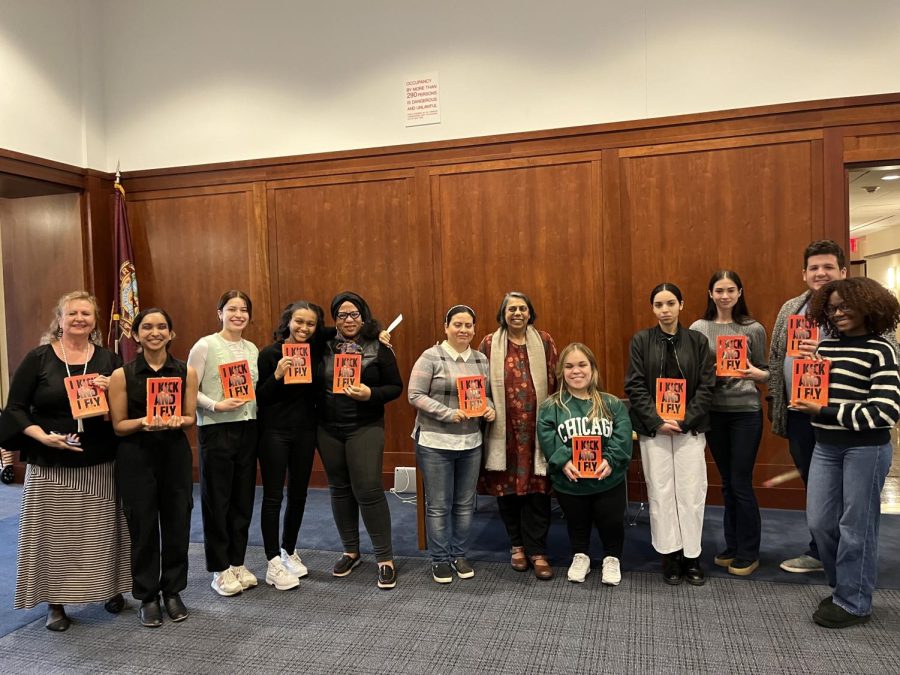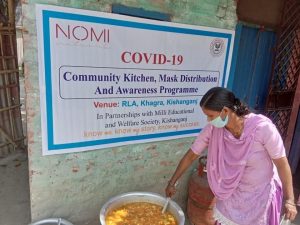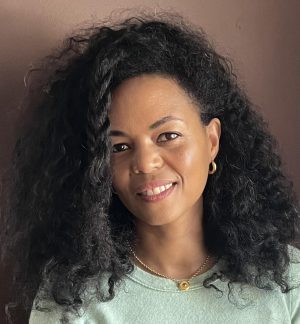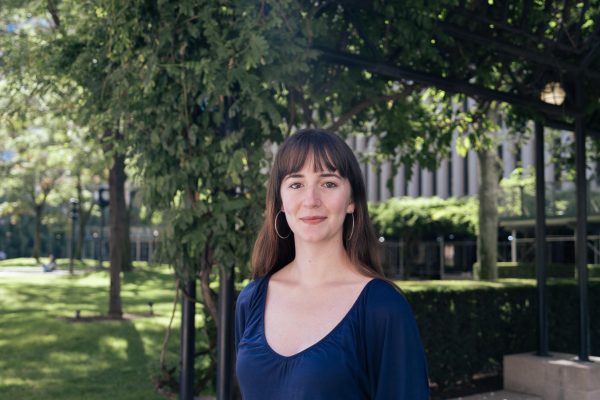Activist Ruchira Gupta Returns To Speak on Human Sex Trafficking
The Emmy Award-winning advocate spoke about her experience fighting against human sex trafficking and the release of her debut novel
May 4, 2023
Ruchira Gupta, activist, journalist, author and professor at New York University, was invited to speak at Fordham University on April 27 about human sex trafficking. Campus Ministry and the Center for Community Engaged Learning (CCEL) hosted the talk as a part of Campus Ministry’s Common Grounds discussion series, which highlights conversations regarding social justice issues. The event took place in the 12th floor lounge of the Lowenstein Center.
Taylor Wedderburn, Fordham College at Lincoln Center (FCLC) ’25, an intern for Gupta and a member of the Fordham Student Advocacy Fellowship program, helped organize the event. The fellowship, which was created by CCEL to empower students interested in activist projects, allowed Wedderburn to collaborate with Campus Ministry to bring Gupta in as a speaker on human sex trafficking. Wedderburn said that she believed Gupta coming to the university would be a great benefit for the community.
“Human sex trafficking is an important topic to discuss,” Wedderburn said. “I know a lot of people have misconceptions about it.”
Gupta has previously spoken at Fordham at the UN Sustainable Development Goals Forum hosted by the Gabelli School of Business on Sept. 26, 2019. She moderated a conversation surrounding the concept of dignity and how it relates to sustainable development.
“Knowing that there are women out there putting in hard work into helping end human trafficking definitely gives you a sense of inspiration and motivation.”Tanzema Qureshi, FCLC ’24
United Student Government at Lincoln Center President-Elect Tanzema Qureshi, FCLC ’24, moderated the conversation. Qureshi began the discussion by prompting Gupta to recount her entire career as an activist against human sex trafficking.
Gupta explained that she came across the human sex trafficking industry while working as a journalist. She described visiting villages in Nepal and discovering that young girls in the village would frequently go missing. Gupta then decided to investigate this further and learned that the girls who would go missing were working miles away in brothels in Mumbai.
Realizing the girls were victims of human sex trafficking had a deep impact on Gupta.
“As a journalist, I had covered war, famine and hunger, but I had not seen this kind of intimate and deliberate violence in my life,” she said. “I was angry, I was upset, but I was also determined to do something about it.”
Gupta also recommended students who are passionate in aiding the fight against human sex trafficking not to worry about whether or not they believe their actions are “big or small” but to do them as if they matter.
“The Selling of Innocents,” a 1996 documentary directed by Gupta, chronicled the sex trafficking industry’s reach from Nepal to Mumbai. According to Gupta, the documentary offered the affected women a platform to raise their concerns and hopes. Gupta won an Emmy Award for outstanding investigative journalism for the documentary, which inspired her to pursue other projects in her activism.
“I decided that I would use my Emmy not to build a career in journalism, but to make a difference,” she said.
Gupta presented her documentary to various governmental organizations, including the United Nations and the United States Congress. In response to the documentary, the U.S. Congress passed the Trafficking Victims Protection Act of 2000 which established greater protection for human sex trafficking victims, prevention of issues such as poverty that lead to human trafficking and enhanced methods of prosecuting perpetrators of said crime.
Qureshi then went on to discuss Apne Aap — the nongovernmental organization that Gupta was inspired to found and of which she is currently president — after filming her documentary. According to Gupta, Apne Aap seeks to protect marginalized and impoverished women who, due to discrimination on the basis of race, class and gender, are likely to be victims of human sex trafficking.
The organization offers women and girls in red light districts housing, healthcare, education and consultations regarding access to governmental services such as food subsidies and registering for legal documents. The organization also develops programming designed to deter men from partaking in the human sex trafficking industry as customers. Establishing the organization became possible as a result of the connections made between women who were originally featured in Gupta’s documentary.
Gupta also recommended students who are passionate in aiding the fight against human sex trafficking not to worry about whether or not they believe their actions are “big or small” but to do them as if they matter.
“I was angry, I was upset, but I was also determined to do something about it.”Ruchira Gupta
Gupta noted that the women she spoke with told her they had four dreams: a school for their children, a job free of violence against themselves, a room of their own that was safe and punishment of their perpetrators.
“I listened to the women,” she said. “Their dreams became my business plan.”
Toward the end of the event, Gupta read an excerpt from her debut fiction novel, “I Kick and I Fly,” which was published on April 18. The book tells the story of how a young girl belonging to a nomadic tribe in India successfully learned to fight off attackers and defend herself from human sex trafficking using to her newfound skills in martial arts. The novel centered around themes of self-autonomy and strength.
“I began writing this book because I wanted to share hope,” she said. “Any issue is depressing as long as we don’t do something about it.”
Gupta won an Emmy Award for outstanding investigative journalism for the documentary, which inspired her to pursue other projects in her activism.
To close off the discussion, Qureshi asked Gupta to give one piece of advice to Fordham students.
“Today, I’m going to leave you not with advice, but with a question: What do you do for others?” Gupta said. “You can call that advice, you can call it a question, you can call it a call to action.”
Gupta also recommended students who are passionate in aiding the fight against human sex trafficking not to worry about whether or not they believe their actions are “big or small” but to do them as if they matter.
Attendees of the event connected with the discussion and Gupta’s stories and were impassioned to learn more about human sex trafficking.
“Hearing about human trafficking in the context of a third world nation was very interesting,” Allison Anwalimhobor, FCLC ’25, said.
Qureshi greatly valued the chance to speak personally with Gupta as the discussion’s moderator.
“Hearing Gupta’s experience gave me the biggest feeling of hope,” Qureshi said. “Knowing that there are women out there putting in hard work into helping end human trafficking definitely gives you a sense of inspiration and motivation.”
“I Kick and I Fly” was available for purchase in the 12th floor lounge during the event. Anwalimhobor bought Gupta’s book after the presentation, and said that she was looking forward to reading the novel.
Following the event, Gupta autographed books and personally spoke with attendees of the discussion. The livestream of the event can be found here.














